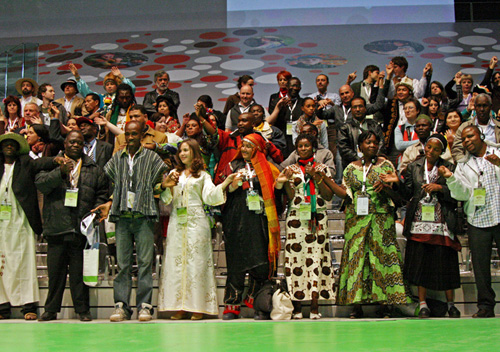
from Italy vol. 55 2011.01.08 Terra Madre = A new world movement, which began with Mother Earth
![]()
In October 2010, an international event called "Terra Madre", organized by Slow Food International, was held in Lingotto (the former home of the Fiat factory), in the city of Torino, Italy. Terra Madre is Italian for "Mother Earth," and 6,400 people gathered from all around the world. There were food producers (farmers, dairy farmers, fishermen), chefs, researchers, students, and even musicians took part in the event. Not only does this event contribute to creating a global network of producers, it also serves as an exciting platform that transcends the boundaries of food and provides opportunities to go back to the roots and think about "a new movement to shift the paradigms of the world."
Back to Table of Contents Terra Madre begins!
Since its inauguration in 2004, Terra Madre has been held once every 2 years, so this year was the 4th event. It was held adjacent to the food fair, "Salone del Gusto," for 5 days, from October 21st to the 25th.
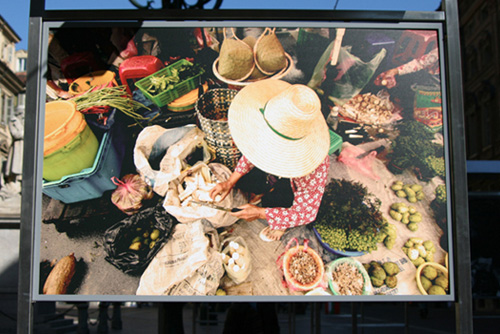 One of the panels from the Terra Madre photo gallery exhibited in a plaza within the city of Torino. It seems like an ordinary shot of a local market, but it shows exactly what we need for the future of mankind and our planet.
One of the panels from the Terra Madre photo gallery exhibited in a plaza within the city of Torino. It seems like an ordinary shot of a local market, but it shows exactly what we need for the future of mankind and our planet.
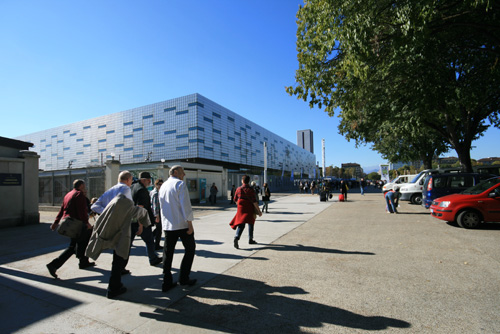 Participants heading to the opening ceremony venue, Palasport Olimpico Isozaki or "Palaisozaki."
Participants heading to the opening ceremony venue, Palasport Olimpico Isozaki or "Palaisozaki."
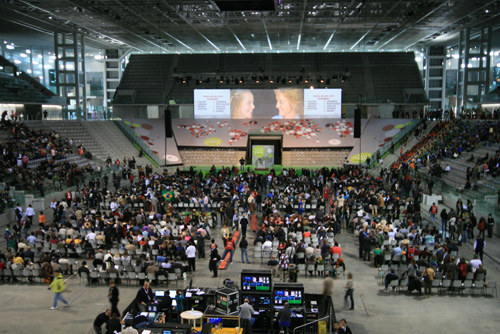 Many participants gather at the gigantic Olympic Palace.
Many participants gather at the gigantic Olympic Palace.
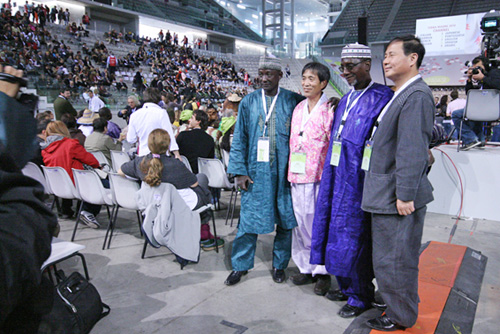 Exchange among participants from different countries had begun even before the opening ceremony took place.
Exchange among participants from different countries had begun even before the opening ceremony took place.
The opening ceremony venue, the Palasport Olimpico Isozaki prepared to welcome approximately 7,000 participants was designed by Arata Isozaki for the Torino 2006 Olympic Winter Games. The opening ceremony began with the powerful dance performance, which felt like the heartbeat of the Earth, by Acud Mirce Acev, a Macedonian ethnic dance group. Then flags from 160 countries around the world entered the arena by continent to the music performed by the youth orchestra and chorus. It really was like the Opening Ceremony of the Olympic Games. The energy of the youthful music that kicked off the ceremony symbolizes what great expectations Terra Madre is bequeathing to the future generations. It was a truly magnificent performance that touched everyone taking part, regardless of his or her cultural background or language.
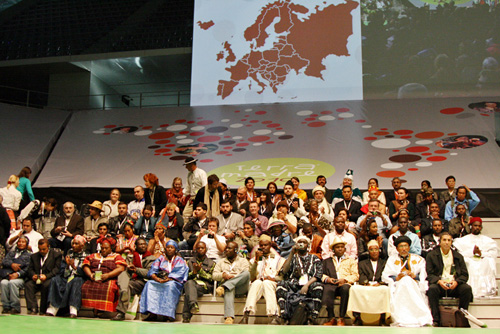 Delegate seats filled with flag bearers of various ethnicities.
Delegate seats filled with flag bearers of various ethnicities.
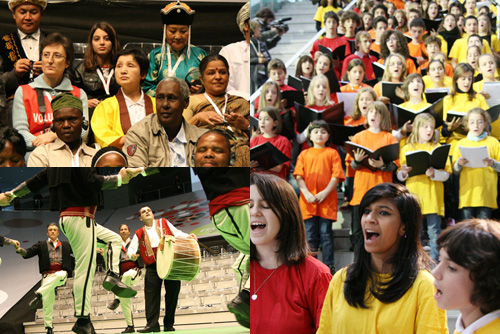 (Upper left) Setsue Baba represented the Japanese delegation. She produces Unzen Kobu Takana. (Lower left) Macedonian ethnic dance group, Acud Mirce Acev. (Right) The youth chorus and orchestra performed the theme songs of each continent very energetically and livened up the event.
(Upper left) Setsue Baba represented the Japanese delegation. She produces Unzen Kobu Takana. (Lower left) Macedonian ethnic dance group, Acud Mirce Acev. (Right) The youth chorus and orchestra performed the theme songs of each continent very energetically and livened up the event.
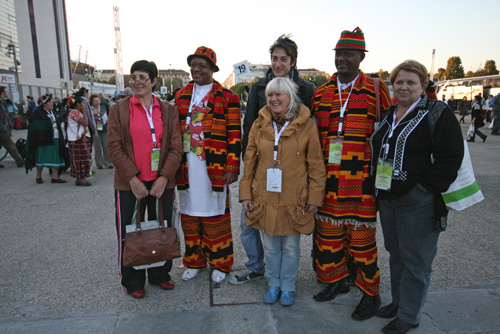 After the opening ceremony, participants and their Italian guest families took commemorative photographs. This event was made possible by the support of a great number of local volunteers.
After the opening ceremony, participants and their Italian guest families took commemorative photographs. This event was made possible by the support of a great number of local volunteers.
Back to Table of Contents Indigenous people also play a leading role
After greetings from the Mayor of Torino and the representative of the Governor of Piemonte, representatives of indigenous people from 5 continents gave their greetings in their respective languages. They were Gamo from Ethiopia; Guarani, Indios of Brazil; Itelmeni of Kamchadal; Sami from Northern Europe; and the Aborigine from Australia.
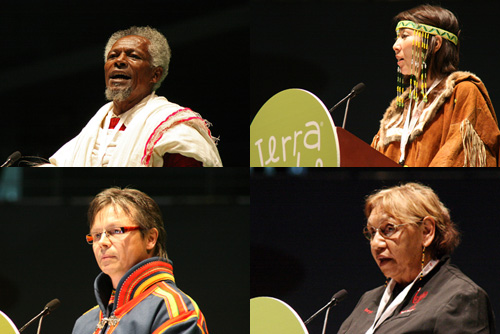 (Upper left) Malebo Mancho Maze from the Gamo tribe of Ethiopia, who represented the indigenous people of Africa, blessed Mother Earth and everyone who attended the opening ceremony like a great shaman. (Upper right) Albina Morilova, from the Itelmeni tribe of Kamchadal, represented Asia. She was so beautiful that her pictures were on the front page of numerous Italian newspapers the next day. She expressed the plight of her tribe and also the spiritual, cultural values offered by food. (Lower left) Ol-Johán Sikku, from the Sami tribe, who represented the indigenous people of Europe, spoke passionately about the intimate relationship between traditional cultures and the environment. (Upper right) Aunty Beryl Van-Oploo, representative of the Aborigine in Oceania, spoke about the importance of Aboriginal education.
(Upper left) Malebo Mancho Maze from the Gamo tribe of Ethiopia, who represented the indigenous people of Africa, blessed Mother Earth and everyone who attended the opening ceremony like a great shaman. (Upper right) Albina Morilova, from the Itelmeni tribe of Kamchadal, represented Asia. She was so beautiful that her pictures were on the front page of numerous Italian newspapers the next day. She expressed the plight of her tribe and also the spiritual, cultural values offered by food. (Lower left) Ol-Johán Sikku, from the Sami tribe, who represented the indigenous people of Europe, spoke passionately about the intimate relationship between traditional cultures and the environment. (Upper right) Aunty Beryl Van-Oploo, representative of the Aborigine in Oceania, spoke about the importance of Aboriginal education.
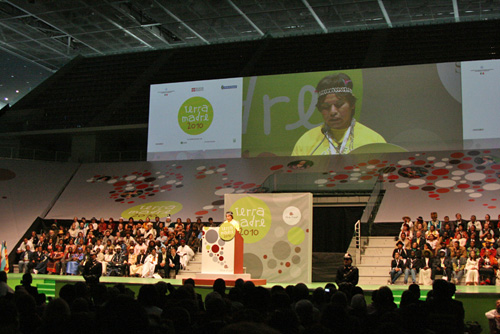 Adolfo Timótio Verá Mirim from the Guarani represented the South and North American continent. Delegates from 160 countries sat behind him.
Adolfo Timótio Verá Mirim from the Guarani represented the South and North American continent. Delegates from 160 countries sat behind him.
Modernization and globalization continues and the survival of life and culture is severely threatened - amid such an environment, the indigenous people remain strongly connected with Mother Earth and continue to live within the traditional cultures that have artfully adapted to the environment. Their speeches represented the core values of Terra Madre and of the current Slow Food movement.
The Slow Food movement, which began in the late 1980s around Carlo Petrini, former food and wine journalist for a left-leaning newspaper, began in order to oppose the fast food industry and to protect the quality of food. It has grown to become a movement of global scale with over 100,000 members. In recent years, the movement has thoroughly incorporated ecological ideas and has defined itself as "eco gastronomy." The Slow Food movement, which places importance on food products as well as "biodiversity," has also set its sights on "cultural diversity," which is intricately related to food. That is why they began to incorporate ethnic music from the third Terra Madre held in 2008. This time, the importance of indigenous languages and their oral tradition and memories connected with them, were selected as themes, and many lectures and symposiums were held on these subjects during the event.
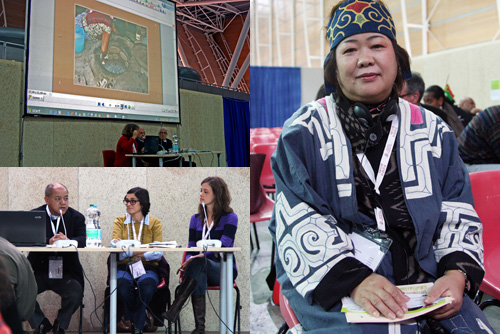 A lecture on the food culture traditionally passed down among the San Mateo community in Mexico was held by Professor Flavia Cuturi of the Università degli Studi di Napoli. (Lower left) Phrang Roy from the Northern Indian indigenous people (on the left) and Shayna Bailey (on the right) from Slow Food International. They are both members of the steering committee of the "Indigenous Partnership for Agrobiodiversity and Food Sovereignty." (Right) Naomi Shimazaki from the Ainu Tribe, who took part as a representative of the indigenous people of Japan.
A lecture on the food culture traditionally passed down among the San Mateo community in Mexico was held by Professor Flavia Cuturi of the Università degli Studi di Napoli. (Lower left) Phrang Roy from the Northern Indian indigenous people (on the left) and Shayna Bailey (on the right) from Slow Food International. They are both members of the steering committee of the "Indigenous Partnership for Agrobiodiversity and Food Sovereignty." (Right) Naomi Shimazaki from the Ainu Tribe, who took part as a representative of the indigenous people of Japan.
Back to Table of Contents Sailors who can navigate towards the future
To wrap up the opening ceremony, the chairman of Slow Food International, Carlo Petrini, appeared on stage. A wave of photographers pushed their way closer, as though they were waiting for a movie star to come out.
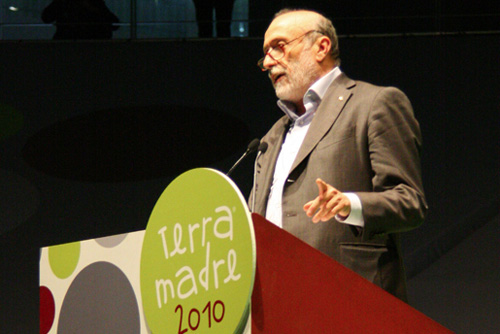 Carlo Petrini, the chairman of Slow Food International, standing at the podium during the opening ceremony. He was a fantastic speaker - his speech was clear and easy to understand, and it was very passionate and moving.
Carlo Petrini, the chairman of Slow Food International, standing at the podium during the opening ceremony. He was a fantastic speaker - his speech was clear and easy to understand, and it was very passionate and moving.
What he first highlighted was the teachings introduced in the speeches by the representatives of the indigenous people. "We have to realize that the defense of traditional knowledge is a practice that supplies us with tools that are indispensable for our lives."
"Who are the principal custodians of this traditional knowledge? There are four categories: indigenous people, farmers, women, and the elderly. They not only must be listened to, but they must be in the first line of defense against the challenges that this world and this crisis are throwing at us. Well, that's not how it is. These groups are the ones that are least considered by politics, the ones that are least considered by the media. A frenetic humanity, only paying attention to profit, is running at full speed towards a precipice. Today, this precipice is financial, social, and environmental... But when homo sapiens reaches the abyss, they will have to stop, they will have to reverse, and in reversing, they will find that the last will be the first, that the least will show us the right way, that indigenous people, women, farmers and the elderly will show us the right path." They will be the sailors that will lead the way to the future.
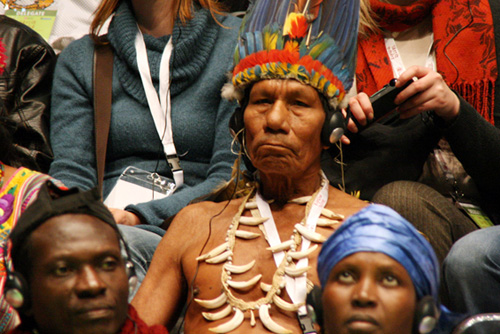 Professor Itoma, who is from an indigenous Amazonian tribe.
Professor Itoma, who is from an indigenous Amazonian tribe.
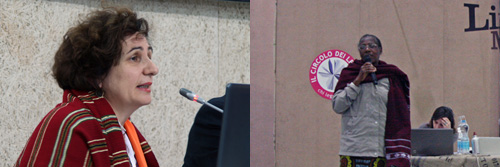 (Left) Representative of the women's group "Donne in cammino" (Walking Women), from Calabria, Southern Italy, giving her speech at the workshop about "traditional knowledge". (Right) A woman from Malawi who spoke at the workshop on "Women's Rights." Many case examples of women's rights movements around the world were illustrated in the workshop.
(Left) Representative of the women's group "Donne in cammino" (Walking Women), from Calabria, Southern Italy, giving her speech at the workshop about "traditional knowledge". (Right) A woman from Malawi who spoke at the workshop on "Women's Rights." Many case examples of women's rights movements around the world were illustrated in the workshop.
I met Vandana Shiva, the well known environmental activist from India, who accepted an interview on issues surrounding women. Ms. Shiva answered my questions and told me how feminine principles and ecosystems function in a similar way. She also emphasized the importance of the role of women in creating a sustainable society (for more, please take a look at the video of the interview.)
Back to Table of Contents Conciliation between science and traditional knowledge
The Slow Food movement has been focused on criticizing the "modernized, industrialized farming" and "global agricultural businesses". In particular, the movement emphasized the "importance of traditional farming knowledge and cultures" from a similar viewpoint as Ms. Vandana Shiva's. But Mr. Carlo Petrini's tone this time was slightly different. He reiterated to the audience that neither traditional cultures nor modern science have alone the perfect answer; understanding and collaboration between the two are necessary to open up new possibilities for the future.
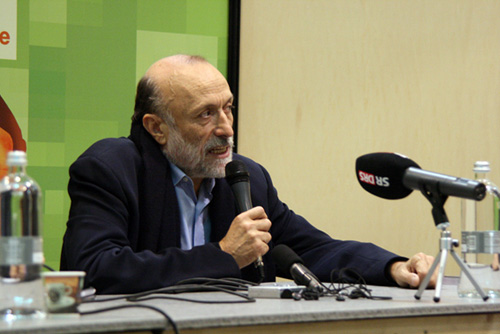 Mr. Petrini answers the questions posed by the media.
Mr. Petrini answers the questions posed by the media.
On the third day, during the question and answer session, Mr. Petrini said that tarting a dialogue between modern Western science including cutting edge technology and the Internet, with traditional knowledge of the elderly, indigenous people and women will give way to a very compelling mixture. This is what will become the true source of power for transformation. So I asked, how will the collaboration and harmony of the two types of "knowledge" be established. In response to my question, Mr. Petrini introduced a case example. "Professors from approximately 400 universities from around the world take part in the Terra Madre, but they have a very important responsibility to fulfill. When they go back to their home countries, they will be working with farmers there. There have already been fantastic cases where farmers go to universities to teach students what they know." A fresh combination of universities and farmers unthinkable in the past - there are high expectations that this will give birth to new knowledge.
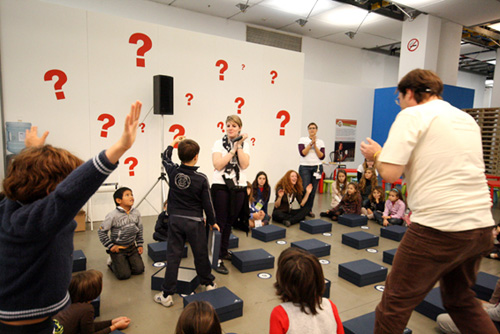 A corner where children can learn about food through games. Children learn the importance of acquiring correct knowledge and interest for food using the 5 senses and their minds. Over 1,000 children took part during the event. The platform for transformation starts with child education.
A corner where children can learn about food through games. Children learn the importance of acquiring correct knowledge and interest for food using the 5 senses and their minds. Over 1,000 children took part during the event. The platform for transformation starts with child education.
Back to Table of Contents Expectations for the younger generation
Another point Mr. Petrini underlined is that young people have now "a great opportunity... You are the ones who will have to reconcile science and modern technologies with traditional knowledge... Putting science and modern technology together with traditional knowledge is the most beautiful challenge you will have in the years to come... You young people have this destiny in your hands. You must not be afraid, you must fly high, you must dream, you must apply yourselves, because this is the most beautiful battle that you can lead at this moment, at this historical moment, and it is the most beautiful battle that young people can fight for humankind."
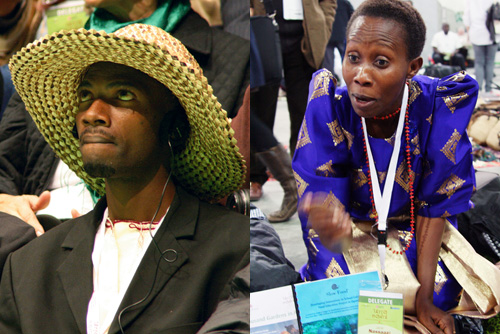 (Left) A young participant from Africa listening to Mr. Petrini's speech very earnestly. (Right) A female farmer from Uganda is introducing the crops grown on her land and agricultural technologies to students from the University of Gastronomic Sciences. Agriculture in Africa is not necessarily impoverished. There is a diversity of crops and sustainable wisdom. A revolutionary change in the African farmers' awareness will be key to saving Africa.
(Left) A young participant from Africa listening to Mr. Petrini's speech very earnestly. (Right) A female farmer from Uganda is introducing the crops grown on her land and agricultural technologies to students from the University of Gastronomic Sciences. Agriculture in Africa is not necessarily impoverished. There is a diversity of crops and sustainable wisdom. A revolutionary change in the African farmers' awareness will be key to saving Africa.
Regardless of where they live, the future of young people today is filled with uncertainties. But Mr. Petrini's words, that place so much expectation on their shoulders, moved them very deeply. He also borrowed from the great French philosopher, Edgar Morin, saying that "everything must begin again, but everything has already begun." Although times are particularly tough, the right path is already clear to us. He went on to say, "You young people will bring about a social metamorphosis. A metamorphosis similar to what happens in the animal world, when an ugly caterpillar spins itself into a cocoon, and turns into a butterfly. This is your mission, turning the caterpillar into a butterfly, through the metamorphosis and change that we face." I am sure every youth who heard these words couldn't help but feel aspired and motivated.
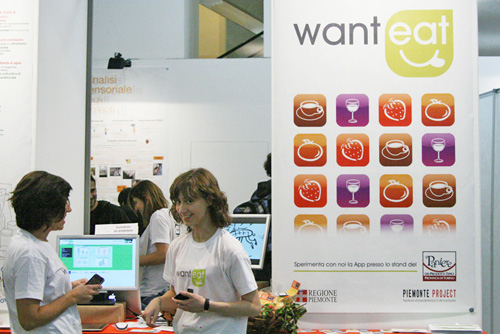 Booth of University of Gastronomic Sciences. Students with gastronomical knowledge and field experience will indeed become the future leading players who will bring tradition and science together.
Booth of University of Gastronomic Sciences. Students with gastronomical knowledge and field experience will indeed become the future leading players who will bring tradition and science together.
Back to Table of Contents Generazione T
There are approximately 100,000 young people under the age 35 in Italy who have decided to go into farming. This is only 7% of the total farming population in Italy, but they create safe and delicious foods taking advantage of modern technology such as computers and the Internet, creating direct communication routes with consumers, and taking technological leaps forward while cherishing the environment, so their status will become increasingly important. Even in terms of sales they are far above average, boasting +75% sales. When Mr. Petrini went to a few top American universities and asked, "Do any of you want to get into farming in the future?" There were 25 to 30 students who raised their hands from among 300 to 400 participants every time. These figures indicate that the world paradigms are truly changing.
Slow Food International refers to these young people who are committed to farming as "Generazione T" (T as in Terra). Through their activities, "farming" will be transformed from an "out-dated and meager vocation" to one that bears a very important function in the future that mixes valuable traditional knowledge and new scientific technology to change the world.
A workshop named "Generazione T" was organized during the event to provide a platform where Mr. Petrini and young farmers from all around the world could meet and open up a dialog.
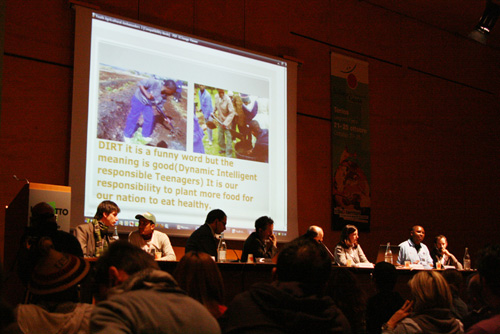 The workshop on "Generazione T."
The workshop on "Generazione T."
One of the participants, Francisco Cabeco, a beekeeper in Jandaira in Brazil told the audience how he was inspired when he attended Terra Madre in 2008. After he returned home, he told, he spent the next 6 months debating with young people in his community. He communicated about the sustainable ways to keep bees in Jandaira and got people to shift away from the ways of their parents' generation, which was dependent on chemical products. Moreover, he explained to the audience that after spreading the concept of "consumers" becoming "co-producers" who actively take part in the production of food products in varied ways, Jandaira people's awareness for food production began to change. His story taught me that one of the important tasks of "Generazione T," which performs multiple roles, is not simply producing food for themselves, but also changing the way people think about farming, food production, and consumption.
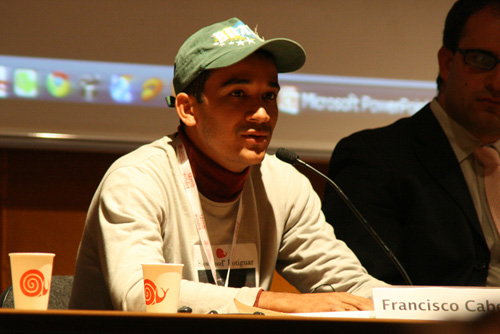 Francisco Cabeco, a young beekeeper from Brazil.
Francisco Cabeco, a young beekeeper from Brazil.
Back to Table of Contents Converging the most advanced knowledge
One of the most striking features of Terra Madre is the massive presence of young people from around the world. Another, even more impressive feature is the concentration of world's top class intellectuals who have a sharp grasp of how the market economy and civilization of advanced nations are collapsing, and who propose new paradigms. These intellectuals include Mr. Carlo Petrini and Ms. Vandana Shiva whom I have already mentioned, as well as the American economist Jeremy Rifkin, who is very well knowledgeable about environmental issues, the French Serge Latouche theorist on "degrowth," and British economist Rai Patel who is well versed in food issues. I am sure that many people who took part in Terra Madre felt through the energy of young people and the visions of these intellectuals that a new world is really on the move.
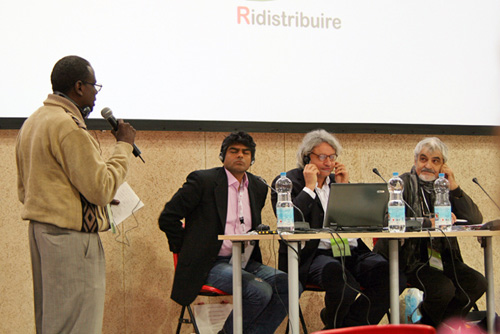 Lecture panelists speaking about the historical transformation of production models (on the right is Serge Latouche and on the left is Rai Patel).
Lecture panelists speaking about the historical transformation of production models (on the right is Serge Latouche and on the left is Rai Patel).
Many lectures and workshops took place simultaneously. What seemed particularly interesting to me was a workshop called "Small is Beautiful 1973 - 2010 - the theory of Ernst F. Schumacher as a way for understanding the crisis we face today". The Italian economist Loretta Napoleoni and Woody Tasch, the founder of "Slow Money" from the U.S., joined the panel to discuss Schumacher's theories and how his book should continue to be read as these theories are becoming more and more relevant.
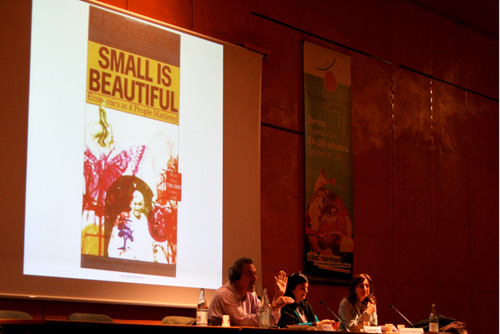 The workshop on "Small is Beautiful." On the left you see Woody Tasch and on the right Loretta Napoleoni.
The workshop on "Small is Beautiful." On the left you see Woody Tasch and on the right Loretta Napoleoni.
Tasch asked himself why people didn't change their ways when they saw that the Earth was merely a small sphere within space when they saw the pictures taken from the Apollo mission in the 1960s. Why did they not shift the direction they were headed when they realized that "there is a limit to growth"?The developed nations grew economically and became wealthier, but there was not much time for leisure, and the growth in consumption did not lead to growth in people's happiness. Nevertheless, as Schumacher warned, the economy swelled enormously and pushed ethics out of the window. That is why we face the problems we do today.
During the same workshop, a discussion on Slow Money founded by Woody Tasch also took place. The Slow Money program was inspired by "Small is Beautiful" and the Slow Food movement. What the Slow Money program means is that investors invest in small-scale food enterprises (i.e. farming, dairy farming, fishing, processors, etc.) in their vicinity. This program encourages investors to commit their assets to local food systems tying money to the land, making visible the way investments are used, and producing results. This movement aims to realize a completely new way of making investments, one that is opposite to the way money is invested today. At present, we don't know where or how our savings are used, or for what purpose, so they may even be used to fund wars. Slow Money is ideal in many ways - fund management morality, investor safety, and contribution to the profits of the local community. And above all, there are high expectations that Slow Money will provide the means to create a new economy on a regional level with the participation of local residents. At the "Generazione T" workshop, Mr. Petrini said that what ever savings he has, he plans to give to the farmers. He described farmers as being much more reliable than banks, underlining the importance of Slow Money.
Back to Table of Contents The future of Terra Madre
Since 2008, Terra Madre has begun to handle cultural matters related to food, such as ethnic music and indigenous languages, which have deep ties with farm work. How will this trend will evolve in the future?
Terra Madre has acquired new features, but according to Ms. Vandana Shiva its foundations are based on food community, and this awareness needs to be reinforced. Mr. Petrini stressed the international significance of Terra Madre: "We don't have to think of this event as being exclusive to Torino". He said that Terra Madre should be held all around the world. By doing so, a holistic network of not only farmers, but also universities and other organizations will spread around the world and take root. This is what really matters.
Mr. Piero Sardo, chairman of "Slow Food Foundation for Biodiversity," the operation team of Slow Food movement, talked in detail about what the network should be like in the future. He says that as an event, Terra Madre should be held once every 4 or 5 years, like the Olympic Games.
According to Mr. Sardo, what is more important is that Terra Madre is now branching into different projects and various food communities are starting to act voluntarily and autonomously. Through such activities, it would be ideal if the food communities in the North, which tend to be richer, would take responsibility to support the food communities in the South who face more adversities, learning from each other and working together. He says this is what Terra Madre should look like in the future. Not only should the food communities in the North provide financial aid: if they can add universities, technicians, young people, and volunteers within the network to their experience and technology, this would truly become a formidable ally.
December 10th is the annual Terra Madre Day, which celebrates Terra Madre all around the world. Even though you may not be currently involved in food production, why not take part and express your appreciation to Mother Earth by eating local produce as much as possible? Now that a big network has been established it is crucial that each and every one of us start acting more autonomously and begin to transform our own way of life.
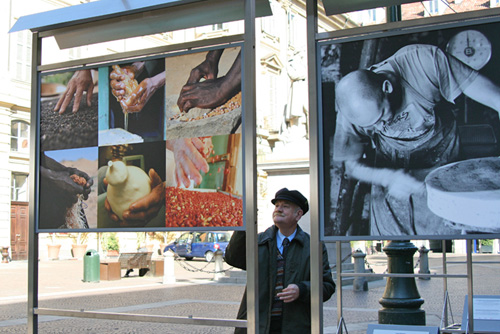 Residents looking at the photo gallery on Terra Madre organized in a plaza in the city of Torino. Terra Madre involves everyone.
Residents looking at the photo gallery on Terra Madre organized in a plaza in the city of Torino. Terra Madre involves everyone.
Related URL
Terra Madre http://www.terramadre.info/
Slow Food International http://www.slowfood.com/
Yosuke Taki biography
Stage director, artist, and critic. Moved to Italy in 1988, currently resides in Rome. Organizes stage performances and photo exhibitions. At present he conducts research on people who embody three dimensions of ecology (natural environment, social environment, personal spiritual environment). As both an artist and critic, he studies the philosophy of human activities, which places life at the center.
Report and original Japanese text written by / Photographs by: Yosuke Taki
Translated by: Yuri Morikawa (oxygen inc.)
Edited by: Tami Okano, Soichi Ueda (Think the Earth Project)















